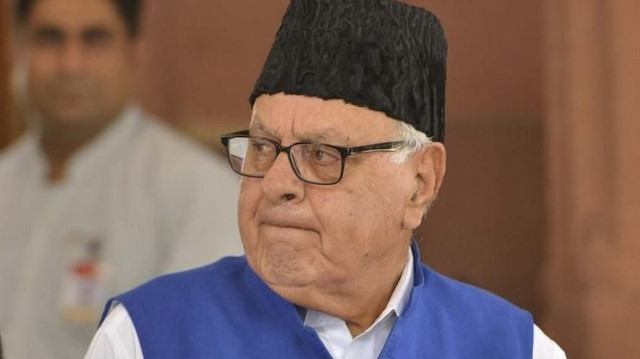
Ex-chief minister Farooq Abdullah, 82, was detained day before Indian govt scrapped Kashmir's autonomous status on Aug. 5
Former chief minister of Indian-administered Kashmir and serving member of Indian parliament was released from preventive detention on Friday.
In a Twitter post, government spokesman Rohit Kansal posted a government order that said Farooq Abdullah’s preventive detention under the Public Safety Act has been revoked.
Under the act, a person can be detained without a trial for up to three months and this detention could be perpetually extended unless a court quashes the detention.
Abdullah's National Conference party welcomed the move as a "step in the right direction."
"We hope it is followed up with release of other prisoners,” said Imran Nabi Dar, the party spokesman.
Dar told Anadolu Agency that Abdullah’s detention period expired last night and added that his party has not climbed down from its demand for the restoration of autonomy.
“We are fighting for its restoration legally in the Supreme Court,” he added.
Abdullah, 82, who has been chief minister of the erstwhile Jammu and Kashmir state thrice, was put under house detention on Aug. 4 last year, a day before the Indian government scrapped the autonomous status of the state and divided it into two federally-ruled territories.
His son Omar Abdullah, a former chief minister and India's former junior foreign minister, is still under detention under the same law.
Like Abdullah, dozens of pro-India politicians were detained either in their homes or a government-owned hotel in Srinagar in the run up to the scrapping of special status.
Abdullah’s National Conference had made restoration of Kashmir's autonomy as it existed in 1953 -- when its erosion started -- as its prime political objective. But it has been criticized for doing little to achieve it when in power.
The region’s oldest political party has been widely criticized for sanctioning Kashmir's last Hindu ruler's hasty and controversial accession with India. After his arrest, Abdullah was ridiculed for championing India's claims over Kashmir.
- Disputed region
Kashmir is held by India and Pakistan in parts and claimed both in full. A small sliver of Kashmir is also held by China.
Since they were partitioned in 1947, the two countries have fought three wars -- in 1948, 1965 and 1971 -- two of them over Kashmir.
Some Kashmiri groups in Jammu and Kashmir have been fighting against Indian rule for independence, or unification with neighboring Pakistan.
According to several human rights organizations, thousands of people have reportedly been killed in the conflict in the region since 1989.
Hello, the comments you share on our site are a valuable resource for other users. Please respect other users and different opinions. Do not use rude, offensive, derogatory, or discriminatory language.
The floor is all yours.








